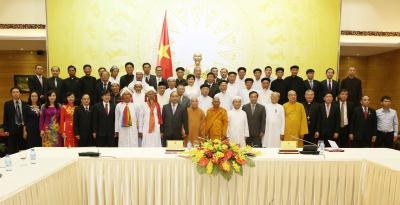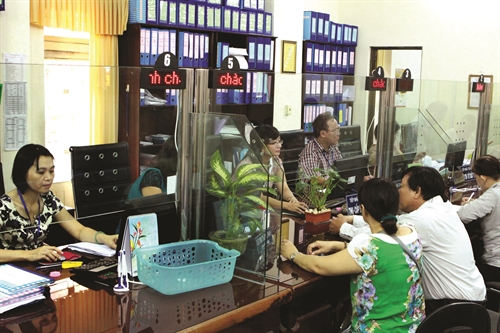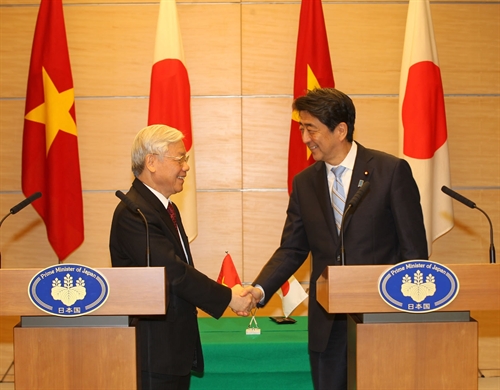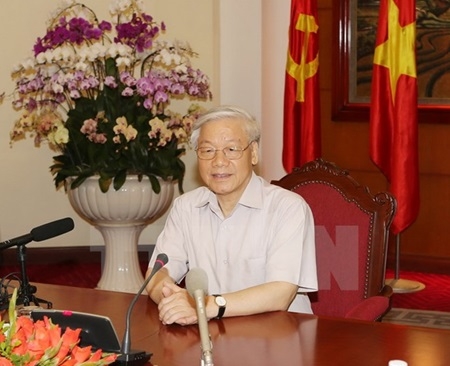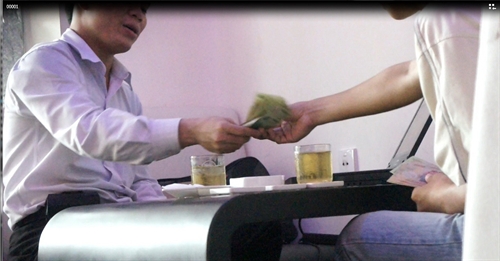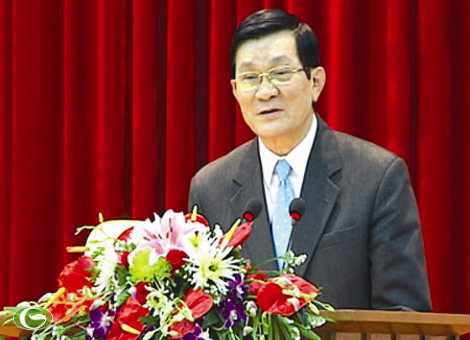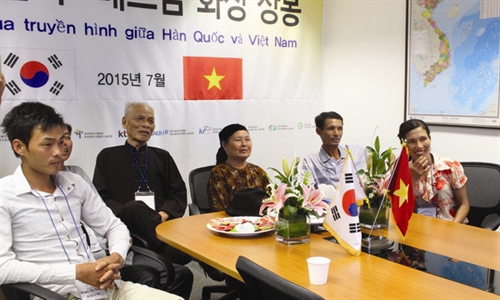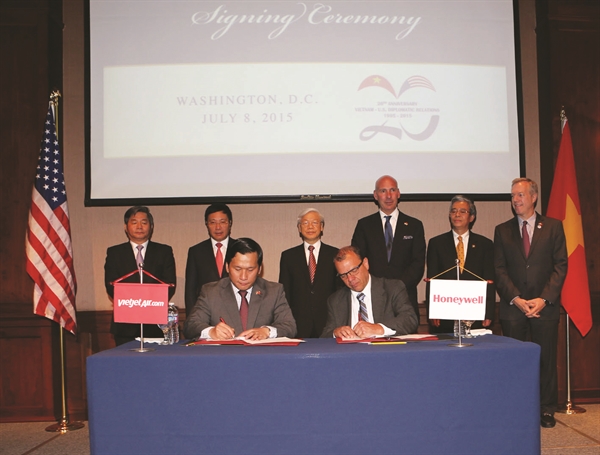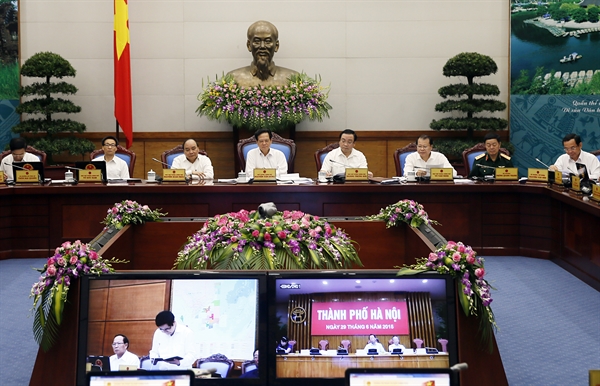The election within the Communist Party of Vietnam is carried out through a strict and democratic process, ensuring to promote democracy to the utmost, to enhance centralism and heighten the Party discipline, said Mr. Nguyen Duc Ha, a Department Director of the Party Central Committee’s Organization and Personnel Commission, in a talk with the Vietnam News Agency (VNA) about the preparation and election of personnel for Party Committees at different levels.
This, according to him, can be clearly seen in the Intra-Party Elections Regulations issued in 2009 then 2010 by the Political Bureau of the Party Central Committee and in 2014 by the Party Central Committee. Particularly, he said, the 2014 Regulation has many new important contents to concretize the implementation of the principle of democratic centralism of the Party.
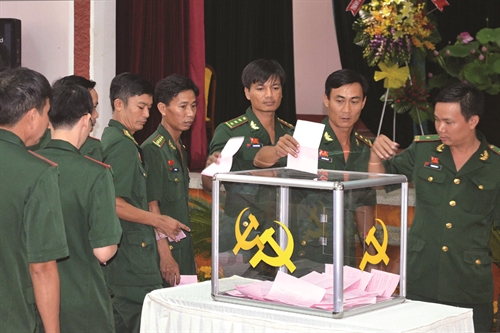 |
| Delegates to the Ho Chi Minh City Border Guards’ Xth Party Committee Congress (2015-2020 term) cast votes to elect the Executive Committee __Photo: Thanh Vu/VNA |
To be included in the list of candidates, a nominee must be recommended by over 50 percent of the members of a congress-convening Party Committee
The Regulation also provides that members of the congress-convening Party Committee must not recommend persons not on the list of nominees recommended by the Party Committee; must neither stand for the elections nor accept the recommendation, if they are not on the list of nominees recommended by the Party Committee.
As provided and guided by the Party Central Committee, from the second year after the Party congresses at different levels, the Party Committees must work out personnel plans for the next-term Party Committees, which will be scrutinized, assessed and supplemented as appropriate in the subsequent years.
In the last year of their terms, the congress-convening Party Committees must direct their attached Party Committees and Party organizations to recommend personnel for the Party Committees according to a strict and democratic process from lower to higher level and to gather comments from various organizations in the political system of the same level.
Every Party Committee member can express his opinions on whether or not he or other Party Committee members continue to join the next-term Party Committee, as well as on the number of the Party Committee members, the structure of the Party Committee and the standing board of the Party Committee of the next congress.
Finally, the congress-convening Party Committee members discuss and cast their ballots to recommend incumbent Party Committee members as well as new faces into the Party Committee of the upcoming congress. Only those who are recommended by more than 50% of the members of the congress-convening Party Committee can be included in the list of nominees recommended to the Party Committee congress.
So, the members of the congress-convening Party Committee, who have directly discussed and expressed their opinions on the list of nominees for the Party Committee to recommend to the congress, must themselves strictly abide by the decision of the Party Committee of which they are members.
The number of candidates must not exceed 30% of the to-be-elected ones
The Regulation provides that the number of candidates on the list of to-be-elected ones must be higher than the number of to-be-elected candidates, but not exceed 30% of the number of to-be-elected candidates, of which the number of candidates recommended by the congress-convening Party Committee will be 10-15% higher.
This rule aims to ward off the scatter of votes due to too many candidates, which leads to inadequate number of elected Party Committee members, thus failing to guarantee the comprehensive leadership of the Party Committee over important fields or geographical areas which need to be led by Party Committee members.
In case the total number of candidates recommended by the congress-convening Party Committee, candidates recommended by delegates to the congress and self-nominated candidates does not exceed 30% of the number of to-be-elected candidates, the congress will make decision and may use such list for election.
If the total number of candidates exceeds 30% of the number of to-be-elected candidates, the congress will present opinions on the candidates recommended by delegates to the congress and the self-nominated candidates.
Based on the presented opinions and the result of selection of candidates according to the number of “yea” votes from high to low, the list of candidates shall be made with a number not exceeding 30% the number of to-be-elected candidates. If such percentage is reached while the persons at the bottom of the list have the equal number of votes, the congress will consider and decide to select candidates among those persons according to the Party Committee structure and Party seniority or to accept the extra number of candidates.
If the number of elected candidates fails to reach the set quantity after the first voting, the congress will decide on additional or no more voting. The list of candidates elected in the second voting must also ensure an extra number and be based on the results of the first voting from high to low.
The Regulation stresses that the list of candidates prepared by the congress-convening Party Committee is the official list recommended to the congress.
Personnel-related work must be democratic and objective
The 2014 Regulation also addresses many other crucial issues such as the election of Politburo and Secretariat members, General Secretary, members and director of the Central Inspection Commission and the additional election of Politburo and Secretariat members; the additional election of alternate members into full-fledged members of the Party Central Committee at Central Committee plenums.
Mr. Nguyen Duc Ha revealed that Politburo Directive No. 36 stressed that Party Committee personnel preparation must be strictly adhere to the Party’s principles and the prescribed order and process, ensuring democracy, objectiveness and scientism to select most prominent Party members with good political and moral qualities, prestige and qualifications for the Party Committees of the upcoming congresses, The Party Committee personnel preparation must be associated with the preparation of leading personnel for the People’s Councils and People’s Committees at different levels for the 2016-2021 tenure and leading personnel of provincial-level National Assembly Deputies delegations.
Regarding the criteria of Party Committee members, he said the selection and recommendation of personnel for the next-term Party Committees must be based on the personnel plans. At the same time, importance must be attached to the discovery and recommendation of new faces with good virtues, talent and development potential, particularly young, female and ethnic minority Party members, in order to ensure the continuity of Party Committee members.
Party Committee members must be completely loyal to the revolutionary aim and ideal of the Party and persistent in the goal of national independence and socialism. They must be industrious, thrifty, honest and righteous, public-spirited and selfless; non-corrupted and resolute in the fight against corruption; have a high sense of organization and discipline. They must be closely attached to people and gain their credit.
Other criteria of Party Committee members include thoroughly understanding the political theory, viewpoints, line and policies of the Party and the State; possessing educational and professional qualifications and capabilities, and good health for effective performance of their assigned tasks.
Party members who themselves or whose spouses or offspring violate the Party’s regulations or the State’s law and policies, thus affecting the prestige of their agencies, units or their own; and those who breach the regulations of the Party Central Committee on political criteria and commit prohibited or illegal acts must not be introduced into the Party Committee. To be recommended for the Party Committees in the armed forces, Party members must also not breach the regulations of the Ministry of National Defense or the Ministry of Public Security.
Among the criteria of Party Committee members, the ideological and political standpoints and performance efficiency are given special importance. Party Committee members must possess innovative and creative thinking, quickly grasp and effectively handle newly arising issues, possess scientific and democratic working style, dare to think, to do and to take responsibility. They must have been serious in promptly redressing their shortcomings and mistakes under the Party Central Committee’s 4th Plenum’s Resolution on party building.
Party Committees must be rationally structured to ensure their comprehensive leadership. A Party Committee should be composed of members in three different age groups. Female members should represent 15% or higher and female members should be present in the standing board of the Party Committee. The rate of young members, who are under 40 years for provincial-level Party Committees and under 35 years for district-level Party Committees, should not be lower than 10% of the total number of Party Committee members. The percentage of Party Committee members who are ethnic minority people should conform to the ethnic structure of each locality and must be equal to or higher than the percentage of the incumbent Party Committee members.
If a Party Committee cannot prepare adequate personnel according to the above structure, the number of elected members must be lower than planned and the remainder will be further prepared and added during the new term.
Regarding the age of incumbent Party Committee members eligible for re-election, they should be able to work for at least a full term or at least for a half term (30 months) or more before retirement age. The previous congress sets this requirement at 48 months for Party Committee members, 36 months for standing board members and 30 months for Party Committee secretaries.
Persons projected to be elected as Party Committee members and leaders of the People’s Councils or People’s Committees of the 2016-2021 term must have at least 36 remaining months before retirement age (for provincial level) and at least 39 months (for district level), counting from the time the Party congress of such level is organized.
Party Committees should have at least one-third of the number of their members of the 2010-2015 term replaced by new faces. Should the number of Party Committee members eligible for re-election account for more than two-thirds, selection must be made based on their qualifications, capabilities, performance, demands for Party Committee members, and their prestige through votes of credit.
After the Party congress, generally those who are not elected into the Party Committee will resign from leading administration positions which need to be held by Party Committee members. Provincial- or district-level officials and officials who have two or more years before reaching retirement age and possess good quality, capabilities and health and wish to continue working, will be considered and assigned appropriate tasks. Those who have under two years before attaining retirement age and cannot be arranged for new tasks may be allowed to discontinue working but still enjoy a number of benefits until reach the retirement age. Those who wish to retire ahead of time will have their aspirations met under the regulations of the Government.
Direct election of Party Committee secretaries
Mr. Nguyen Duc Ha noted that the Party Committee elections at the Party congresses at different levels are carried out in two forms: direct election (exercise of direct democracy) and indirect election (exercise of representative democracy).
Specifically, at the congresses of the Party cells (including grassroots Party cells and Party cells attached to grassroots Party Committees), the elections of Party Committees, secretaries and deputy secretaries are carried out in only one form, that is direct election. The Party cell congress (attended by all members of the Party cell) will elect the Party Committee, then the secretary and deputy secretary (if necessary) among the elected Party Committee members.
At the congress of the Party organization (including grassroots Party organizations and Party organizations attached to the Central Committee), the Party Committee election is carried out in both forms: direct election and indirect election. The congress elects the Party Committees (direct election); then the Party Committee (on behalf of the Party organization) elect the standing board among the elected Party Committee members, then elect the secretary and deputy secretaries among the standing board members (indirect election).-
Timetable for holding Party congresses at different levels
- Party members’ congresses or congresses of grassroots Party organizations must be held for no more than 2 days, starting from April and finishing in June 2015;
- Congresses of Party organizations of the level higher than the grassroots level and district and equivalent level must be held for no more than 3 days, finishing in August 2015;
- Congresses of Party organizations of provinces and centrally run cities and the Army and Public Security Force must be held for no more than 4 days and the congresses of the Party organizations of central organizations must be held for no more than 3 days, starting from September and finishing in October 2015.
(Politburo Directive No. 36-CT/TW dated May 30, 2014, on congresses of Party organizations at different levels toward the XIIth National Party Congress)
